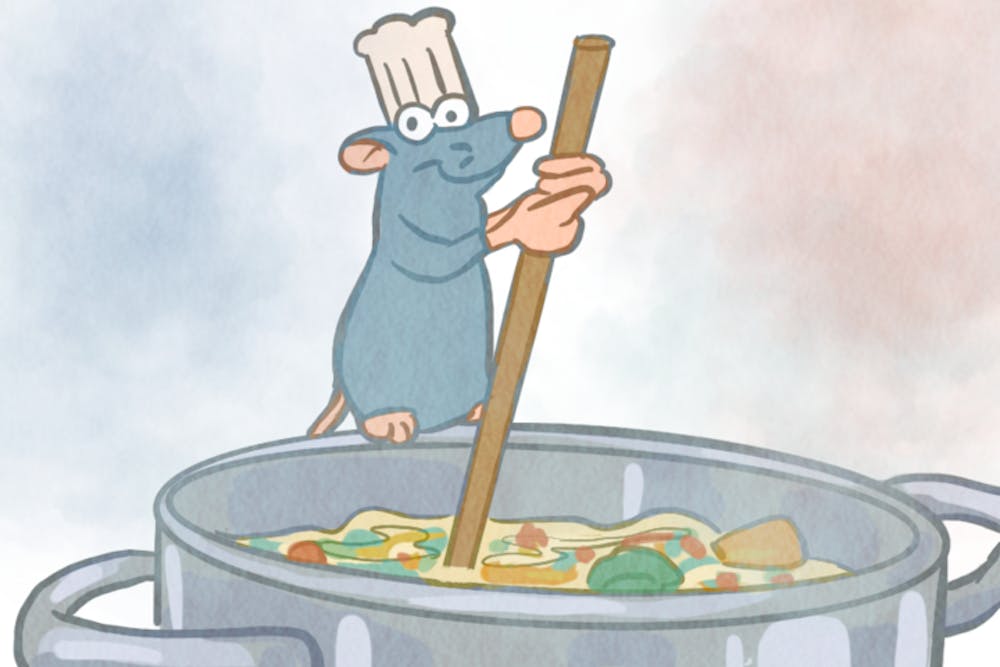Among the ever–expanding Hollywood canon of films about food, the best one will forever be Pixar’s Ratatouille.
The film follows a rat named Remy who dreams of being a chef. After being separated from his disapproving family, he ends up in the restaurant of his cooking inspiration, Chef Gusteau. Through a series of hijinks, Remy ends up helping a garbage boy named Alfredo Linguini rise to Head Chef by hiding in his chef’s toque and cooking amazing meals.
Though some of the animation looks a bit clunky 13 years later, the characters’ expressions are still emotive and stunning. The food is beautifully animated and inspires genuine hunger. I still dream of eating a ratatouille that looks as good as the titular dish of the film. The film made everything from a cube of cheese from the trash to snooty French cuisine appeal to the whimsy of childhood.
The lessons Ratatouille teaches about food are simple yet profound, and probably the first time the film’s younger demographic had been asked to contemplate what they eat.
“Good food is like music you can taste, color you can smell…You need only be aware to stop and savor it,” Gusteau remarks as Remy watches him on television.
Forget when we were easily distractible children; how many of us think about what we’re eating now? How many of us take time out of our daily schedules to meditate on and savor our meals?
Ratatouille sees food and cooking as art, and it sees art as a process that requires courage above all else. The film continually speaks to the courage it takes to thrive instead of just skating by and surviving. Remy always has the ability to eat food from the garbage and survive like the rest of his family, but he yearns for more. What he loves best about humans—both before he meets any and even after he sees evidence of how they kill his kind—is that they discover and create. What a wonderful way to see what it is to be human, the power of creation we usually ascribe to divinity.
Courage is a common message in children’s movies, but Ratatouille is unique in that it espouses the courage to create, to be selfish about your ambition and passions. Early on in the film, Remy chooses to fix a pot of soup in the restaurant instead of leaving the incredibly dangerous kitchen. Maybe it’s just a plot device—or maybe it’s about the desire and ambition to prove oneself, to innovate. The tagline of the film is even “He’s dying to be a chef!", and despite its comical intention, it speaks to the desperation we feel to fulfill our dreams.
“Anyone can cook, but only the fearless can be great,” Gusteau says as Remy yet again watches him on television.
The antagonist of the film, food critic Anton Ego, mocks that philosophy until he eats Remy’s ratatouille. He’s an iconic villain, with his skeletal appearance, coffin–shaped office, and delight in ruining restaurants' reputations.
Ego eventually learns that truly anyone can cook, even a rat. As he eats the ratatouille, he launches into the memory of his mother’s cooking, of her wiping his tears after a bad fall from his bike. It's a memory of comfort and safety; Ego cleans his plate. He is reminded, and thus reminds the audience, that art is about being open to the new, to potential failures and overlooked ideas. Anything someone creates out of love, putting themselves out in the world, is more meaningful and valuable than any critique.
“The world is often unkind to new talent, new creations. The new needs friends,” he says, referring to the food and art and all that we set out to do.
Even with the success of impressing Ego, Ratatouille doesn’t shy away from themes of failure and moving forward. Most of the conflicts in the film are resolved fairly quickly, but the restaurant is still shut down at the end of the film because of a health inspection. However, Remy’s experience fulfills his dreams and allows him to move on from under the shadow of Gusteau to his own restaurant.
Remy’s ability to cook makes him a special rat, but it isn’t what helps him succeed. What does is his willingness to grow and change. It is his ability to see food, the world, and himself at their fullest potential.
Ratatouille opened yearning in my heart for a cramped apartment on top of Paris, seeing all the lights around me in the city of dreams. It’s the best food movie because nothing will ever taste as good as a piece of cheese and a strawberry in the hands of a rat, their flavors a display of pink and yellow fireworks. It’s about the joy in a good bowl of soup, of laying under the stars and thinking only about what you’re eating, about someone making omelets for you right as you wake up, about a perfect bowl of ratatouille your mother sets on the table after wiping your tears. It’s about the joy of going off–recipe knowing you could fail, but ever moving forward, leaving your mark on the world.







